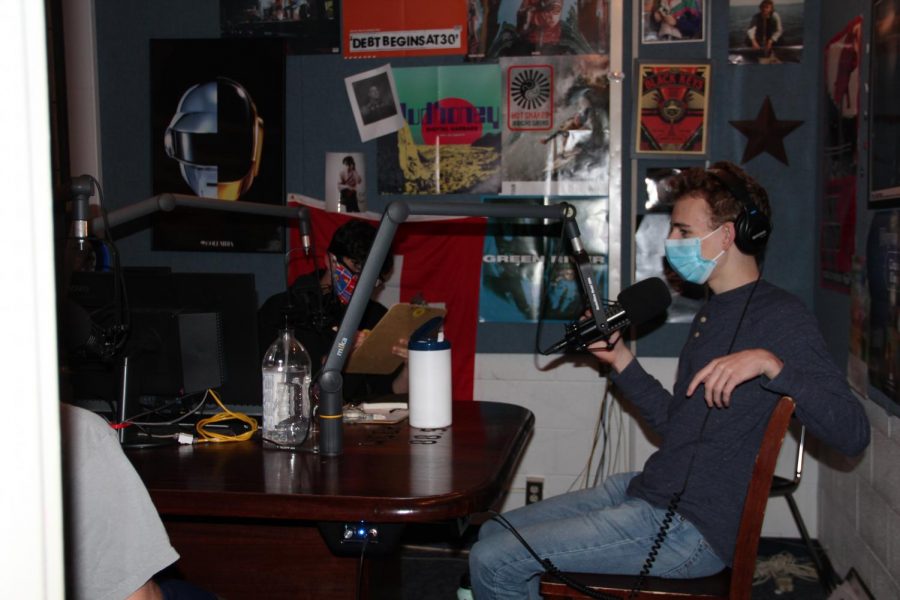Live from the studio: Covid-19 restrictions affect WGBK
Talkative Tommy: Donning his mask, Tommy Marquardt, co-host of the WGBK’s That Sports Show, continues to give listeners insight on sports despite the challenges posed to radio by Covid-19.
November 20, 2020
With a mask resting on her face and hand sanitizer spread across her hands, senior Station Manager Emma Langas takes a deep breath as she begins to broadcast the news on WGBK, South’s student radio station, for the evening. Like many, she must take precautions while participating in extracurriculars.
When the pandemic first hit in March, the radio team packed up all of their station materials and worked from home, according to senior Ethan Albin, WGBK’s public relations director. Along with his radio classmates, Albin had a difficult time adjusting to at home learning with the station.
“They gave us our own kit full of recording equipment: a microphone [and] a scarlet box which is what transfers the sound to our computer,” Albin said. “At the beginning it was harder. We were all there thinking, ‘We need to be productive while we are home.’”
Langas hopes that the radio team will show others how Covid-19 is being handled from different perspectives all around the community. Radio has created “Village Voices,” a segment in which different sources are interviewed on how the pandemic has affected them, along with what they are doing to remain successful during this time.
“Because people can’t go out and reconnect with [others, radio] wanted to connect the Glenview community together to get a bunch of viewpoints,” Langas said. “Our main goal has just been trying to be the voice of Glenview to spread awareness [about Covid-19].”
The adaptation of pre-Covid-19 radio to current times was a difficult transition for Langas, who had never experienced talking on air with a mask before. Langas explained that the thick material of the protective masks are great in terms of safety, but add an extra layer of difficulty when speaking on the microphone.
“It is a little difficult speaking with a mask on because we were right up the microphone,” Langas said. “I was wearing a really thick mask one time while recording and I knew the audio wasn’t going to be as good. It’s adapting to those changes that are really hard.”
Currently, radio’s main goal is creating quality content for others to listen to and enjoy, Albin shared. Despite the struggle, Albin explained how the radio team and himself are continuing to stay productive and work virtually with one another.
“[Our main goal is to] talk to our audience and give them what they want,” Albin said. “We try hard to produce quality content on air and in our production”
Junior Stephanie Pitterman, who worked with radio her sophomore year, was looking forward to her second semester radio class this year. Pitterman’s love for radio stemmed from her being able to express her interests and talk about something really cares about: music. Due to the restrictions of Covid-19, she wasn’t sure what that class would look like.
“I’m hoping I’ll be able to go back and work with other people and be able to talk about something I really love, which is music,” Pitterman said. “I wanted to work more with music and doing the programs on the air.”
Langas reflected on the difference of what radio looked like in the spring versus today, as a result of the safety regulations put in place. Before masks, social distancing and limited capacity were mandatory, Langas enjoyed the collaborative aspect that working with her peers in radio provided her.
“It’s hard not having that direct feedback and trying to do a lot of things by yourself on your own computer,” Langas said. “In the future, we hope to be able to bring more people into the studio.”
Although the pandemic has challenged South’s radio station, Langas remains optimistic about the future of radio. As other activities remain completely remote or still at pause from Covid-19, Langas feels grateful to still be able to contribute to radio.
“I feel like it gives me a sense of, ‘I’m still doing what I was doing before [Covid-19 hit],’” Langas said. “I have a sense of normalcy in my life because I’m still trying to keep the station running, which is more than I can say for some of my other classes and electives.”



